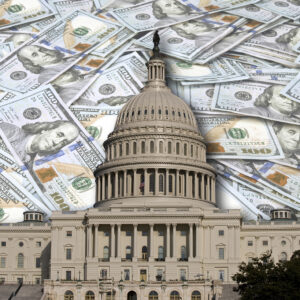Inflation may be high and the U.S. economy may have dipped into recession, but New Hampshire Democrats are rushing to back major new spending initiatives out of Washington, D.C.
On Wednesday, Sens. Maggie Hassan and Jeanne Shaheen voted to pass a bipartisan plan to spend $280 billion to subsidize domestic microchip manufacturing and fund science and tech research. Reps. Annie Kuster and Chris Pappas also support the spending package.
Now comes news of a deal between Senate Majority Leader Chuck Schumer (D., N.Y.) and moderate West Virginia Democrat Sen. Joe Manchin to spend an additional $739 billion on green energy, health care subsidies, and–according to Manchin–paying down the national debt. The plan includes some $500 billion in new tax revenues, some from a 15 percent minimum corporate tax, and doubling the number of IRS agents to conduct more audits of taxpayers.
Manchin has labeled it the “Inflation Reduction Act of 2022,” though the impact of $450 billion in new spending on climate and healthcare on inflation is less than clear. However, advocates for green energy policies say the impact will be significant.
“This is the most significant action on climate and clean energy that we’ve ever taken in this country,” said Sen. Tina Smith (D., Minn.).
Between the two plans, President Joe Biden is proposing $1 trillion in new spending, even as inflation hits a 41-year high of 9.1 percent.
Hassan celebrated the passage of the $280 billion tech subsidies bill in the Senate, taking the unusual step of posting a Twitter thread extolling its virtues. “From cell phones and cars to microwaves and military equipment, semiconductors are everywhere. Without a secure supply of them, we’re vulnerable to rising costs or compromised military equipment,” Hassan tweeted.
On the $739 billion Manchin bill, Hassan said she was “encouraged by the agreement on the Inflation Reduction Act, which will fight inflation, pay down the deficit, make prescription drugs cheaper, and lower energy costs.
“We have an opportunity to address pressing priorities for Granite Staters and all Americans, and I’ll keep working with my colleagues to finalize a measure that reduces costs and strengthens our economy.”
State Sen. Chuck Morse (R-Salem), who’d like to challenge her in November, said Hassan’s part of the problem, not solutino.
“This is a crystal clear example as to why the 51st vote in the U.S. Senate must be a Republican from New Hampshire. Democrats will tax and spend us into oblivion and per usual, Maggie Hassan prefers to sit on the sidelines until called to follow behind Chuck Schumer and Joe Biden,” Morse said. “We need real leadership, not some Democrat puppet, to represent the 603. When I’m the 51st vote, you can bet that we’ll tackle inflation the right way – saying no to tax increases, cutting off spending, and making our economy great again.”
Former Londonderry Town Manager Kevin Smith, who’s also running in the U.S. Senate GOP primary, called the new proposal “insane.”
“It is absurdity of the highest order to propose $430 billion in new socialist Green New Deal spending on the same day our nation fell into recession as a direct result of the out-of-control spending. If Maggie Hassan was truly bipartisan as she claims, she would vote against this hundred-billion-dollar Green New Deal giveaway; but we all know she’s just going to be another rubber stamp for Chuck Schumer and the far-left. Any Democrat who votes for this insane tax-and-spend bill does not deserve to be in office,” Smith said.
Rep. Chris Pappas echoed Hassan when asked about the new proposal by Drew Cline on WFEA radio Thursday morning, praising the microchip and investment spending and generally supportive of the Manchin bill.
“I haven’t seen a bill yet, and until we do I won’t commit to anything. But I am absolutely in support of negotiating lower prices for prescription drugs that would cut costs for families and also save the government a lot of money in terms of outlays for Medicare,” Pappas said. “In terms of the CHIPS Act, it’s a smart investment in the future of our country.
“These advanced chips, only 15 percent are made here in the United States, and we’ve seen serious disruptions in the supply chain. It’s important we support U.S. manufacturers and make more good right here,” Pappas said.
When Rep. Annie Kuster was asked about the data showing two quarters of declining GDP and what it means, she dodged the question by praising the new spending package.
“To be honest, I haven’t [looked],” Kuster told Punchbowl News. “I’m more focused on the package that might be passing in the Senate. I’m super excited about the jobs and opportunities that are going to come out of this.”
While Democrats may be basking in the glow of an agreement with the recalcitrant Manchin, questions remain about their ability to get the bill passed. Sen. Kyrsten Sinema (D Ariz.), for example, has expressed reservations in the past about supporting the tax policies it includes.
Meanwhile, Republicans are already using the proposal to label Democrats the party of “tax and spend” economics.
“Now that the data scientists have confirmed that the U.S. is indeed in a recession, clearly fueled by excessive government spending and a strangling of domestic energy, it is even more unconscionable for congressional Democrats to conspire to force yet another tax-and-spend bill on the American people,” said Paul Teller, executive director of Advancing American Freedom, an organization founded by former vice president Mike Pence.
Akash Chougule with Americans for Prosperity called the legislation “a random grab bag of corporate welfare and tax hikes that will do nothing to address inflation–except potentially put us even deeper into recession. For years, members of both parties–including Sen. Manchin–agreed you don’t raise taxes in a recession because it would be devastating to the economy. With a rapidly shrinking economy, inflation at historic highs, and gas prices over $4 a gallon, you’d be hard-pressed to find a worse time for more spending and higher taxes.”




